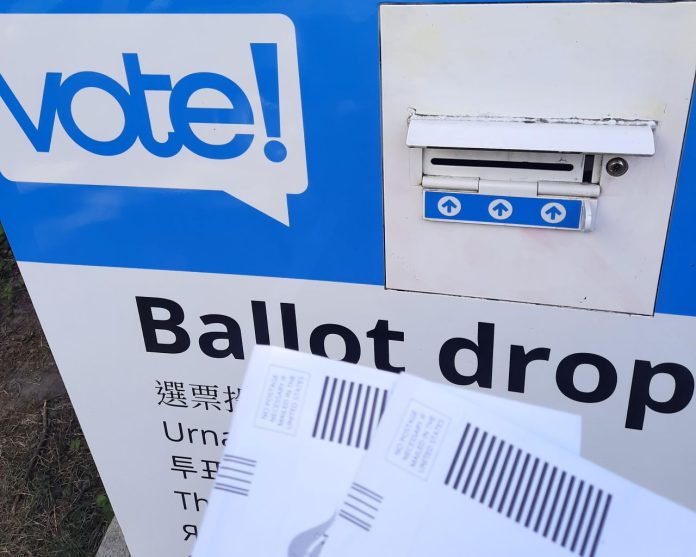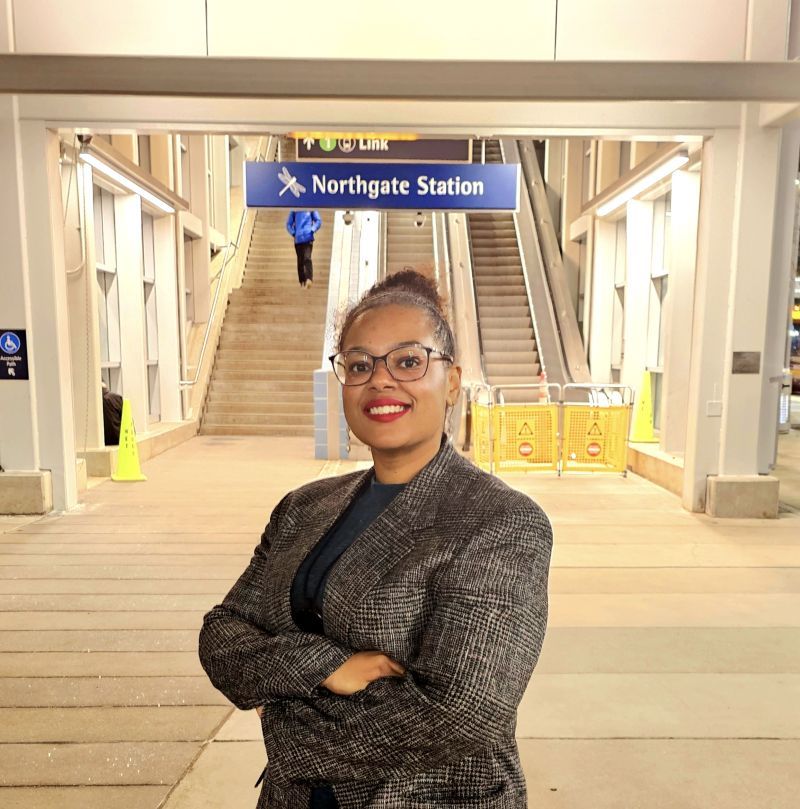Ballots are arriving in mailboxes across Washington State and voters have big decisions before them. Urbanists have big opportunities to make gains and signs for optimism in primary results. The nine-member Seattle City Council could elect as many as seven new members, with all district-based seats up for reelection and some races are shaping up to be nail-biters. For example, just 89 votes separated leading vote-getters Joy Hollingsworth and Alex Hudson in District 3 primary results, ahead of their head-to-head general election rematch.
Outside spending is pouring in and could end up overshadowing Seattle’s democracy voucher program, which is meant to reduce the impact of special interest spending and allow more candidates to run viable campaigns without being rich themselves. Some of the biggest campaign funders this cycle have been the National Association of Realtors and master builder groups.
Perhaps counterintuitively, these housing industry players have mostly landed on the side of more conservative candidates who are more timid about increasing zoning capacity, easing other housing restrictions, and funding affordable housing with new revenue sources — in other words, the candidates who failed to earn the endorsement of The Urbanist Elections Committee, which has endorsed the following candidates in part for their pro-housing message.
Check out our full endorsement writeup for why the committee landed like it did.
The Urbanist’s 2023 General Slate Cheat Sheet
- City of Seattle Proposition No. 1: Vote Yes
- King County Council, District 2 – Girmay Zahilay
- King County Council, District 4 – Jorge Barón
- King County Council, District 6 – Claudia Balducci
- King County Council, District 8 – Teresa Mosqueda
- Port of Seattle Seat 2 – Sam Cho
- Port of Seattle Seat 5 – Fred Felleman
- Seattle City Council District 1 – Maren Costa
- Seattle City Council District 2 – Tammy Morales
- Seattle City Council District 3 – Alex Hudson
- Seattle City Council District 4 – Ron Davis
- Seattle City Council District 5 – ChrisTiana ObeySumner
- Seattle City Council District 6 – Dan Strauss
- Seattle City Council District 7 – Andrew Lewis
- Bellevue City Council, Position 3 – Mo Malakoutian
- Bellevue City Council, Position 5 – Janice Zahn
The unfortunate reality is that there are plenty of actors within the real estate industry that benefit from the status quo where new housing is scarce and prices are sky high, particularly those in the business of building and selling single-family homes. Most Seattleites would not want cartel-like impulses empowered to guide policymaking, however.
A few different outlets have released polls seeking to frame the election, with public safety and homelessness once again emerging as top issues.
While voters want to address safety issues, a recent KOMO-commissioned poll of Seattle voters found that favorability ratings for the Seattle Police Department (SPD) had cratered, with 64% expressing unfavorable view. The eroding of favorability in this poll was relatively new and could stem from a string of SPD scandals, including a revelation a top police guild official had accidentally recorded himself laughing at the death of Jaahnavi Kandula. In 2022, SPD had been slightly above water in this poll at a 45% favorable to 43% unfavorable. The police department is now 31 points underwater one year later.
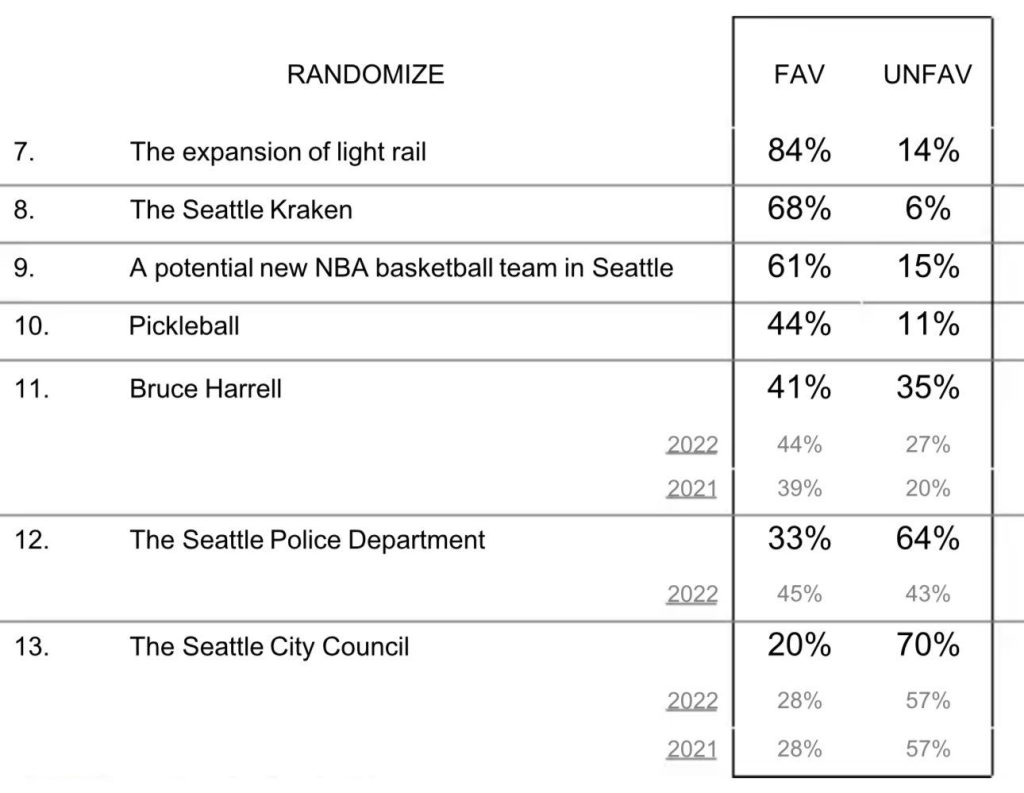
Meanwhile, support for public safety alternatives like civilian crisis responders has remained strong. Nonetheless, the City of Seattle has been slow to stand up and expand such programs, although Mayor Bruce Harrell’s recent budget proposal did include a dual-responder pilot program that would have civilian experts in fields like mental health or social work respond alongside police officers, but advocates say it falls short of the civilian-led response they requested and other peer cities have implemented.
This confluence — the unpopularity of SPD and growing support for civilian safety programs — suggests an opportunity for candidates who have a clear message around holding SPD accountable for misconduct and ineffectiveness while standing up alternatives that make the city less reliant on the department as the cure-all for every safety issue. The Urbanist’s slate of endorsed candidates includes many candidates with such platforms and messages.
Housing affordability is also increasingly a concern and could be a dark horse candidate for cleaving election issue.
However, the chances of robust housing debate happening this election got a setback due to the Harrell administration’s continued foot dragging on the release of its draft of the Comprehensive Plan update, a once-a-decade opportunity to transform housing and land use policies that steer homebuilding. While initially promised in April, it’s still not released, which suggests the Harrell camp has a date after the election in mind.
All the delay, however, means a mad dash to conduct outreach on the plan, incorporate city council amendments, finalize the plan, and secure city council passage. It also robs voters of a chance to see the highly consequential plan and how candidates are reacting to it before they cast their vote.
As it stands, here’s how the Seattle City Council races shake out.
District 1: Can outside spending overcome Costa’s lead?
In District 1, Urbanist-endorsed Maren Costa faces business-backed tech lawyer Rob Saka. Costa had a sizable lead in a crowded primary field with 33% to Saka’s 24%, and every candidate who was eliminated endorsed Costa over Saka — even candidates seemingly closer to Saka on the political spectrum, such as Phil Tavel. This seemingly gave Costa some momentum as she headed into the general, but Saka did win the backing of Mayor Bruce Harrell and leads in fundraising, along with the assist in outside spending.

“Saka does not come close to matching Costa’s qualifications or vision, which is perhaps why Costa advanced out of her primary with such a strong showing,” The Urbanist Elections Committee wrote in its endorsement. “As her former opponents have noted, Seattle would benefit from a climate-focused leader who understands just how every issue of urbanist import is related to this defining challenge of our time. Vote Costa.”
Fired from Amazon for her climate organizing, Costa has shown she’s willing to put climate action and her moral convictions ahead of personal gain or climbing the ladder. That kind of clear-eyed leadership will be needed to tackle the challenge that responding to climate catastrophe presents. As a supporter of Alternative 6 to the comp plan, she’s also shown a knack for tying housing and climate solutions together.
District 2: Morales leading
In District 2, Councilmember Tammy Morales led in the primary with 52% of the vote, and it appears to be her race to lose, but challenger Tanya Woo has raised a ton of money and garnered the endorsement of the Seattle Times and Seattle Councilmember Sara Nelson. Mayor Harrell has stayed out of this race so far.
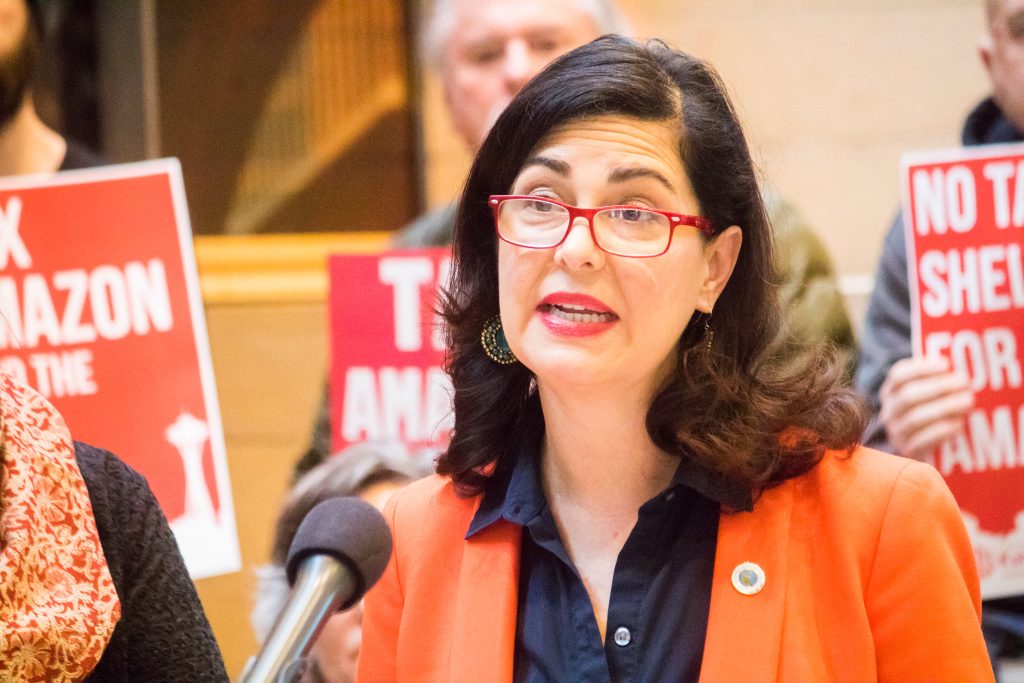
One issue for Woo to contend is a very spotty record in local elections. Despite seeking one of the highest offices in the city, Woo has not voted for the office she seeks in past elections. This lack of experience, paired with a relatively vague campaign platform, could steer more voters toward Morales, who in the Election Committee’s estimation has distinguished herself in her first term as a housing and safe streets champion. She was among the votes for the JumpStart payroll tax.
Seeking to contrast herself with the incumbent, Woo showed up at city hall to lobby for a drug bill encouraging prosecutions of drug possession and public use via City Attorney Ann Davison. Critics say the bill would reignite the drug war and include no new funding for drug diversion and treatment programs or assurances that diverting arrested drug users away from jail and court-related debt would happen in practice, thus leading to counterproductive outcomes. Advocates had beat back the first attempt to pass such a bill in June, but Councilmembers in Andrew Lewis and Lisa Herbold swung their votes to support a substantially similar bill this fall and it passed.
District 3: Hudson is in tight race
Alex Hudson earned a glowing endorsement form The Urbanist Elections Committee, who pined for her to join the Sound Transit Board to help steer a tilting ship there, in addition to being a great candidate to lead the city council’s transportation committee.
“Hudson took the reins as executive director at Transportation Choices Coalition in 2018 and continued to be in the thick of transportation policy debates,” the committee wrote. “From being front-and-center in the negotiations around the last statewide transportation package, which delivered free transit for kids on every transit agency in the entire state, to the push to reform Sound Transit’s punitive fare-enforcement regime, Hudson has shown she can deliver.”
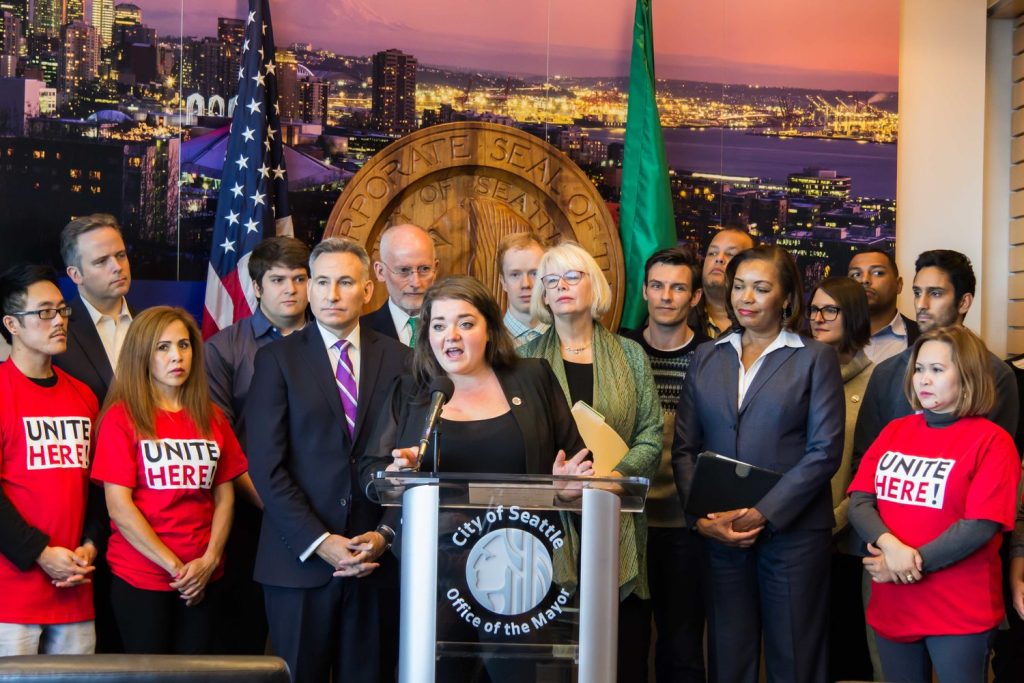
Meanwhile, opponent Joy Hollingsworth has a record that undermines some otherwise pro-housing rhetoric, which the committee also picked up on.
“[Hollingsworth] has a history of opposing housing projects, including a modest five-story apartment proposal on Madison Street near a set of properties owned by her family. While Hollingsworth worried about her family’s view of Bellevue, many D3 residents worried about keeping a roof over their head and not being priced out of Seattle.”
Hollingsworth issued a rebuttal in The Stranger that called on urbanists to be more intersectional and argued that she cannot be a part of the problem while also suffering from the racist past and present of housing policy as a Black woman. The piece failed to explain her opposition to the apartments on Madison or whether her view had since shifted on whether five-story apartment buildings are compatible near single family homes and triplexes, however.
District 4: Davis: “I am the public safety candidate”
Urbanist-backed tech consultant Ron Davis was the leading vote-getter and is fighting to stave off Maritza Rivera, who has been the leading beneficiary of outside spending so far, including an infusion from both the National Realtors and a local master builders group. Davis has contributed guest op-eds at The Urbanist and has a clear record of advocacy for urbanist, housing, and safe streets spaces.
My opponent has $230k in IEs from from Trump donors, National Association of Realtors & lobbyists trying to buy the race. Even after the Democratic party publicly reprimanded her for lying about my platform.
— Ron Davis (@ronpdavis) October 19, 2023
Don't let them buy Seattle. Please donate.https://t.co/d97Zq4mVyM
“Davis clearly has policy chops,” the committee wrote. “We loved hearing him explain the importance of single-stair mid-rise apartments to unlocking livable, affordable, family-sized housing across the city, as he did at a recent forum we co-hosted with the Complete Communities Coalition. Davis isn’t shy about pursuing big progressive policy wins even in the face of powerful opposition, and that is an attitude that is sorely needed on council.”
Davis outlined detailed evidence-based plans around drugs, homelessness, and crime that show he offers a credible solution on that front instead of just playing political rhetoric and making promises he can’t keep about police hiring or decreasing homelessness without new investments.
“I am the public safety candidate,” Davis said in a recent campaign email. “The bus driver’s union endorsed me because their drivers are worried about workplace safety and drug consumption on their buses, and they said I was the only candidate with an actual plan to address it.”
Another sleeper issue in this race is that a majority of Rivera’s coworkers at the Seattle Arts and Culture Department have alleged that she created a toxic workplace environment as deputy director under the Durkan administration, characterized by a “pattern of defensive, hostile, and condescending interactions with Rivera.” Moreover, Hannah Krieg reported in The Stranger that “a few workers described Rivera’s supervision style as full of misplaced priorities, micro-management, and lack of strategic thinking.”
Similar accusations came out on the campaign trail about former Mayor Jenny Durkan who ran a large office as US Attorney for Western Washington. Most local media and endorsing groups brushed aside the accusations and Durkan won election handily, but she did end up proving to be a poor executive, as the warning signs seemed to indicate. Will voters heed similar warning signs about Rivera?
District 5: Can ObeySumner pull off an upset over establishment-backed Moore
Former King County Superior Court Judge Cathy Moore led in the primary with 31% to social equity consultant ChrisTiana ObeySumner’s 24%. With an open seat to replace retiring Council President Debora Juarez, a crowded field emerged in the primary. After endorsing Nilu Jenks in the primary, The Urbanist Elections Committee backed ObeySumner in the general.
“ObeySumner’s core values align with ours,” the committee wrote. “They support Alternative 6 for the Comprehensive Plan, believe in prioritizing investing in affordable housing programs and incentivizing developers to create more affordable housing projects, and support expanding the Housing Levy. They support safe pedestrian-friendly streets; oppose encampment sweeps; and understand that public safety is created through addressing root causes, not through criminalization. As a person with a disability, they’ve seen firsthand where our sidewalks and transit fails and they’ve led on seeking improvements.”
Moore has not fully played the part of the typical centrist, but has tacked toward the center as the process has gone along and establishment endorsements — from Mayor Harrell to Juarez and County Executive Dow Constantine — have piled up, including with a flip flop on the drug war bill. Still, she has backed Alternative 5 to the Comprehensive Plan and expressed some openness to adding progressive revenue sources. This led the committee to call her an improvement over Juarez with “thoughtful approaches to a number of urbanist issues.”
Facing a need to make up ground on Moore from the primary, ObeySumner has noted their need to continue working their day job to pay bills as the campaign has gone on. Facing a part-time campaigner could give Moore a structural edge, given greater financial stability and more conventional background from which she launched her campaign. On the other hand, voters could see ObeySumner first-hand experience of living paycheck to paycheck as a Black, disabled, nonbinary person as an asset and the type of person who needs to be better represented in government.
District 6: Strauss defies labels and the haters
In District 6, many were expecting Dan Strauss to face tough reelection prospects, in part due to redistricting that added a relatively conservative part of Magnolia to his district. Strauss has seemed to prove them wrong, pulling in almost 52% in the primary. Now, Fremont Chamber of Commerce executive director Pete Hanning has not mounted the world’s stiffest challenge, but Strauss has seemed to outmaneuver him all the same.
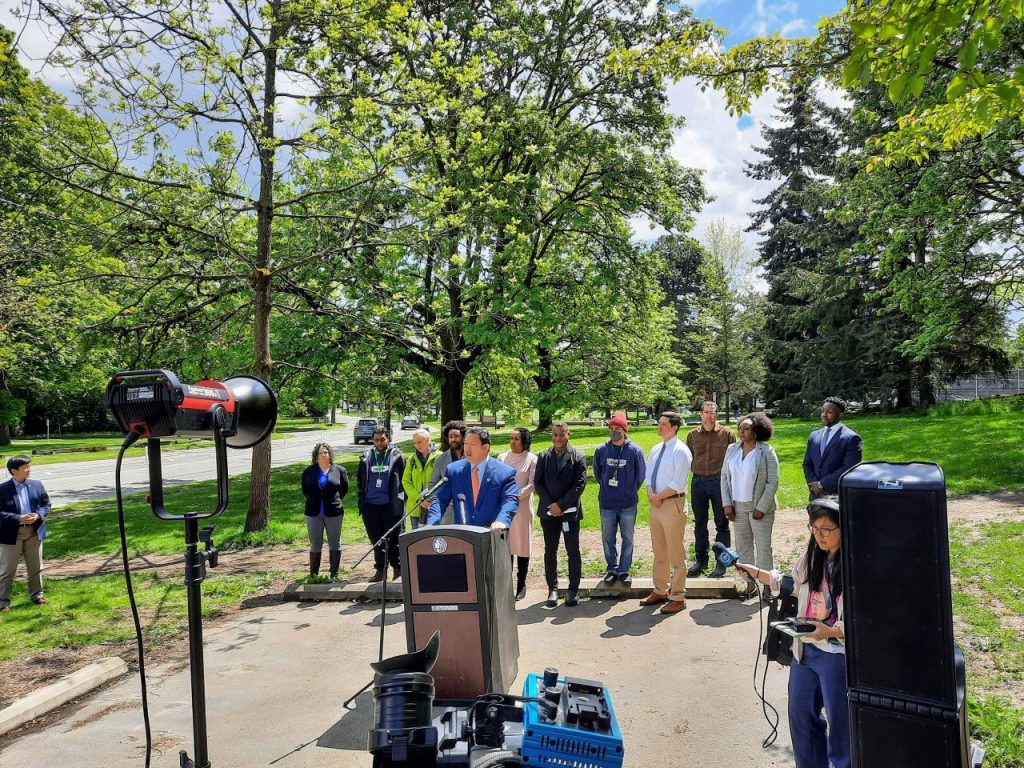
Last year, Mayor Harrell had warned of consequences and electoral challenges for councilmembers that stood in the way of his agenda, particularly about homelessness and crime. Strauss has largely sidestepped that wrath by frequently partnering with the mayor, standing by his side at press conferences, and backing him on controversial legislation like the drug war bill. And, as far as that’s concerned, it’s worked, as Harrell has endorsed Strauss rather than back his opponent.
Despite Strauss backing the JumpStart corporate payroll tax, big business seems to have largely sat out this race. Hanning has garnered the Seattle Times endorsement, but few other big name nods and almost no outside spending. As such a Hanning challenge appears very longshot, and Strauss appears poised to keep his post and urbanists hoping from a more strident leader in his second term.
“We’re hoping for more from the land use committee chair; the City Council sorely needs a strong leader in this role as it works to pass a “Major Update” to its Comprehensive Plan by the end of 2024,” the committee wrote. “While we appreciate Strauss’s dedication to traffic safety and liberalizing street cafe rules, the few changes he has worked to implement have been relatively minor.
Strauss has not raised a stink or nary a peep as the Harrell administration has repeatedly delayed release of the big comp plan update his committee will have to digest and sign off on. If the mayor’s proposal ends up falling short of housing needs, Strauss might have to be ready to get a little less cozy with the mayor to get a good plan to guide the next 20 years of growth and infrastructure development in Seattle.
District 7: Lewis kettled in hot water
District 7 Councilmember Andrew Lewis has the toughest odds for reelection based on primary results. He does lead Queen Anne homeowner activist Bob Kettle 43% to 32%, but as the only incumbent below 50%, it is safe to say, Lewis is in hot water.
Like Strauss, Lewis has done some tacking to the center. However, he’s also been a strident voice for durable homelessness solutions and standing up civilian crisis response programs. And he voted for the JumpStart payroll tax that spared the city from pandemic cuts and boosted investment in affordable housing and the Green New Deal. He’s shown a willingness to grapple with nuance and take tough votes.
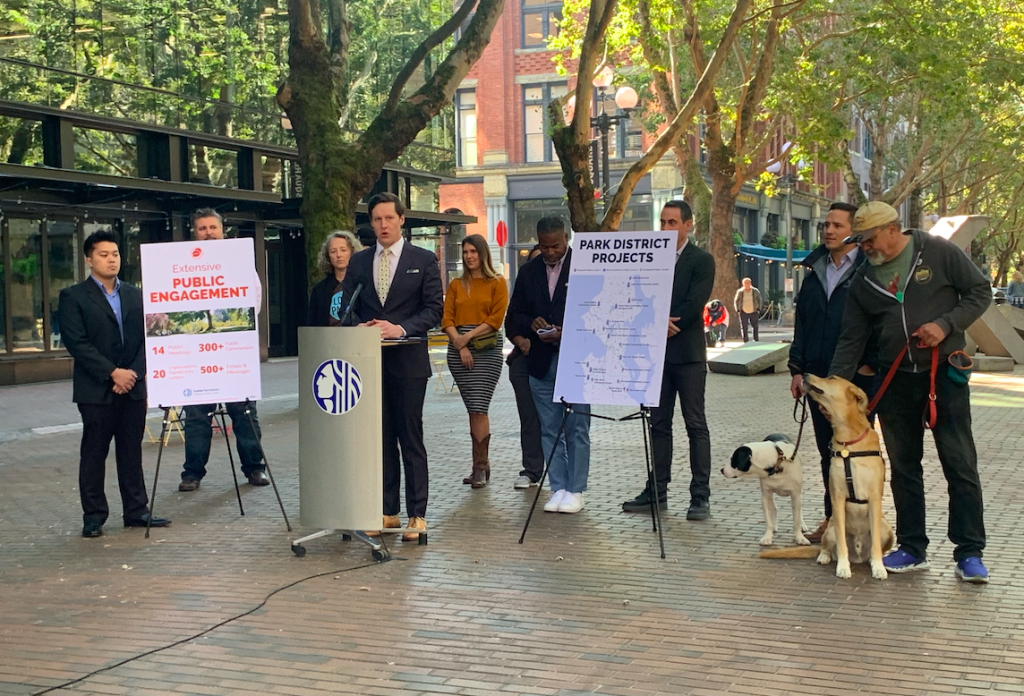
Kettle is running a throwback campaign focused on homeowner backlash, showing no interest in appealing to urbanists or housing advocates after skipping both The Urbanist questionnaire and interview and the forum we co-hosted focused on the comp plan and housing solutions. He has the support of the Seattle Times editorial board, Councilmembers Sara Nelson and Alex Pederson, and some unsavory wealthy donors via the National Realtors and others. His main goals seem to blocking progressive tax reform and wishcasting fantastically optimistic projections for SPD hiring, which offers little help to residents facing public safety issues in the here and now.
“Kettle would have no qualms about a drug war and go all in a punitive, carceral approach,” the committee wrote. “We have no faith Kettle would pursue the civilian crisis responder program that Lewis is doggedly fighting to push the Harrell administration to implement despite obstruction and footdragging from the Seattle Police Department and the Seattle Police Officers Guild. Kettle would vote against zoning changes the city needs to address its housing crisis, and he would be an irresponsible steward of the JumpStart dollars Lewis has supported. Vote Lewis.”
Doug Trumm is publisher of The Urbanist. An Urbanist writer since 2015, he dreams of pedestrian streets, bus lanes, and a mass-timber building spree to end our housing crisis. He graduated from the Evans School of Public Policy and Governance at the University of Washington in 2019. He lives in Seattle's Fremont neighborhood and loves to explore the city by foot and by bike.

